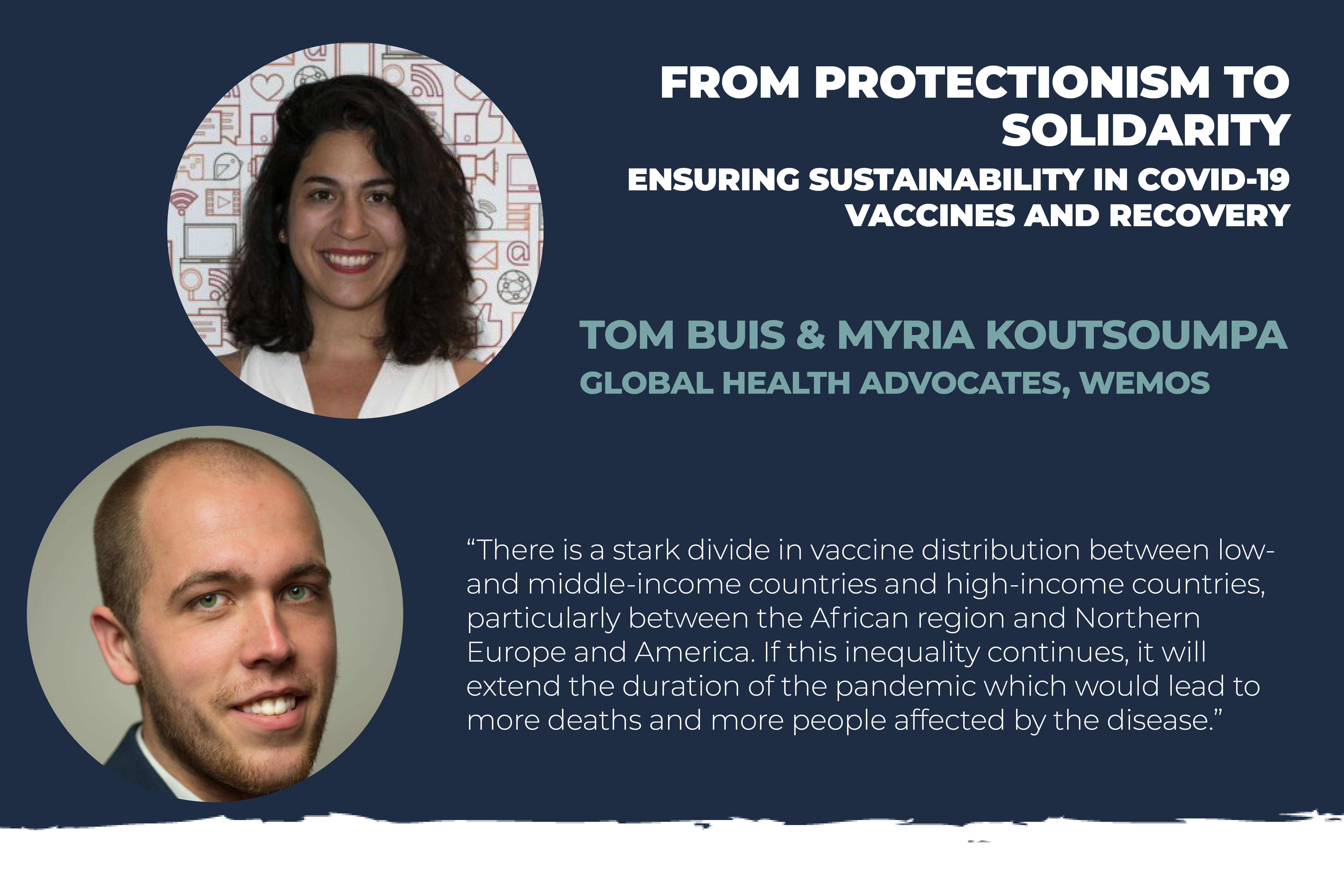From Protectionism to Solidarity: Ensuring sustainability in COVID-19 vaccines and recovery
6 April 2021

There is a stark divide in vaccine distribution between low- and middle-income countries (LMICs) and high-income countries (HICs), particularly between the African region and Northern Europe and America. If this inequality continues, it will extend the duration of the pandemic which would lead to more deaths and more people affected by the disease. There are also economic consequences to this inequality: if LIMCS are not supported and certain regions remain excluded from vaccinations, it will cost HICs $119 billion a year. In comparison, it would cost $25 billion to supply LIMCs with vaccines. If we do not deal with this inequitable access to COVID-19 vaccines, we are at risk of increasing mutations which could lead to less effective vaccines or infections with more deadly outcomes. Equitable access to vaccination benefits and protects everyone.
COVAX, a global initiative led by the UNICEF, Gavi, the World Health Organization (WHO), the Coalition for Epidemic Preparedness Innovations, and others, aims to deliver COVID-19 vaccines for 20% of the population in some LMICs. While this addresses some of the vaccine inequity, more can be done. If we think that vaccinating 20% of Europe’s population is unacceptable, why do we think this target is acceptable in other countries around the world?
Most of the issues surrounding the inequitable distribution of COVID-19 and vaccine nationalism are related to insufficient global manufacturing capacity. A lot of the manufacturing capacity and research is concentrated in just a few regions around the world such as the USA, Europe, Canada, and Russia, but this capacity is not sufficient to supply the world with enough doses. What we ideally want to see is a decentralised global network of manufacturing capacity.
However, there are barriers to this. The first is intellectual property, which gives the owner the exclusive right to produce or use the technology that they have invented or bought, therefore limiting others in doing so. The second barrier is knowledge. Vaccines are very complex biological products that require extensive knowledge and experience to reproduce, and this can hinder manufacturing capacity.
A solution to both problems is sharing intellectual property, data, and know-how through the WHO’s COVID-19 Technology Access Pool (C-TAP). In this pool, pharmaceutical companies can voluntarily share their patent rights, as well as the knowledge necessary to make COVID-19 medicines and vaccines. In return, they receive financial compensation. With this mechanism, more pharmaceutical companies will be able to manufacture COVID-19 vaccines, making more doses to reach the populations across the globe. If more factories produce vaccines, it means that more vaccines can be quickly distributed through COVAX. It may sound like a utopia, but it draws from the Medicines Patent Pool of 2010, which helped to make HIV medication accessible to people around the world. Currently the C-TAP is empty and only has support from fifty WHO member states. National advocacy is essential in ensuring global access to COVID-19 technologies like vaccines. This can be done through writing to your local members of parliament about C-TAP. We have provided lobby letters on our website: www.wemos.nl.
Vaccine nationalism can be seen as part of a bigger issue in health systems financing challenges. A key term is ‘the fiscal space’, which refers to the flexibility that the government has in their spending choices, including for the public health sector. The fiscal space can be increased by increasing domestic resources through tackling international tax injustices, such as illicit financial flows, that drain national economies. Africa only loses $89 billion in illicit financial flows in one year on average. Debt relief is also key, as debt service payments often exceed domestic health expenditure in LMICs. Finally, on-budget foreign aid can be increased. We have calculated that if countries committed to spending 0.7% of their Gross National Income on aid met their commitments, $541 billion could be given, as opposed to the $153 billion that is given now. Health is a human right which means that governments have an obligation to protect and fulfil it by exploring, adopting, and implementing all possible legislative, administrative, and budgetary measures.


0 Comments
Leave a comment
Your email address will not be published.